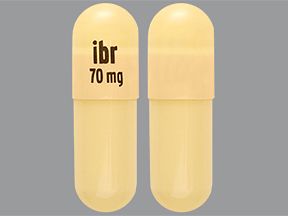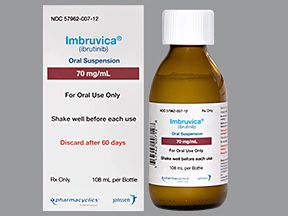If you have certain kinds of blood cancer or chronic graft versus host disease (cGVHD), your doctor might recommend Imbruvica (ibrutinib). It’s a prescription medication used in certain adults to treat:
- some types of chronic lymphocytic leukemia (CLL)
- some types of small lymphocytic lymphoma (SLL)
- Waldenström’s macroglobulinemia (WM)
- mantle cell lymphoma (MCL)*†
- marginal zone lymphoma (MZL)*†
- cGVHD*
* For this use, Imbruvica is taken after certain other treatments have been tried.
† For this use, Imbruvica received
The active ingredient in Imbruvica is ibrutinib. An active ingredient is what makes a drug work.
This article describes the dosages of Imbruvica, as well as its strengths and how to take the drug. To learn more about Imbruvica, including details about how it’s used, see this in-depth article.
Note: This chart highlights the basics of Imbruvica’s dosages. Be sure to read on for more detail. And please keep in mind that this article covers Imbruvica’s standard dosages, which the drug’s manufacturer provides. But always follow the dosing schedule that your doctor prescribes.
| Condition | Typical daily Imbruvica dosage |
| CLL and SLL | 420 milligrams (mg) |
| WM | 420 mg |
| MCL | 560 mg |
| MZL | 560 mg |
| cGVHD | 420 mg |
The information below describes typically prescribed dosages of Imbruvica and details about the drug’s forms.
What are the forms of Imbruvica?
Imbruvica comes as a tablet and a capsule. Both of these forms are swallowed.
What strengths does Imbruvica come in?
Imbruvica capsules come in strengths of:
- 70 milligrams (mg)
- 140 mg
Imbruvica tablets come in strengths of:
- 140 mg
- 280 mg
- 420 mg
- 560 mg
What are the typical dosages of Imbruvica?
The information below describes dosages that are commonly used or recommended. But be sure to take the dosage your doctor prescribes for you. Your doctor will determine how often you’ll take Imbruvica based on your condition.
Dosing for chronic lymphocytic leukemia (CLL) and small lymphocytic lymphoma (SLL)
The dosage of Imbruvica for CLL and SLL is 420 mg taken once daily with water.
Your doctor may prescribe this as one 420-mg tablet or three 140-mg capsules to equal the 420-mg dose.
For CLL and SLL, your doctor may prescribe Imbruvica by itself or with one or more medications. These could be Rituxan (rituximab), Gazyva (obinutuzumab), or Bendeka (rituximab/bendamustine). If you take rituximab or obinutuzumab with Imbruvica on the same day, your doctor may suggest taking Imbruvica first.
Dosing for Waldenström’s macroglobulinemia (WM)
Imbruvica’s dosage for WM is 420 mg once daily with water.
If your doctor prescribes tablets, you’ll take one 420-mg tablet once per day. If you take Imbruvica capsules, you’ll take three 140-mg capsules once daily to equal the 420-mg dose.
Imbruvica may be prescribed by itself or with rituximab for WM. Your doctor may suggest taking Imbruvica first, if you take it on the same day as rituximab.
Dosing for mantle cell lymphoma (MCL)
The dosage of Imbruvica for MCL is 560 mg taken once daily with water.
You’ll either take one 560-mg tablet or four 140-mg capsules to equal 560 mg once daily. Your doctor will talk with you about which form of Imbruvica is best for you.
Dosing for marginal zone lymphoma (MZL)
For MZL, the typical Imbruvica dosage is 560 mg once daily with water. Your doctor might prescribe this as one 560-mg tablet or four 140-mg capsules taken once per day.
Dosing for chronic graft versus host disease (cGVHD)
The dosage of Imbruvica for cGVHD is 420 mg once daily with water. You’ll either take one 420-mg tablet daily or three 140-mg capsules to equal 420 mg once daily.
Is Imbruvica taken long term?
Yes, doctors typically prescribe Imbruvica as a long-term treatment. If you and your doctor determine that Imbruvica is safe and effective for you, you’ll likely take it long term.
Dosage adjustments
Your doctor might prescribe a dose reduction if you’re taking other medications with Imbruvica or if you have liver problems. This includes mild to moderate liver disease. If you have severe liver disease, Imbruvica likely won’t be prescribed for you.
You also may need a dose adjustment if you experience certain severe side effects with Imbruvica.
Your doctor will discuss your exact dosage and any adjustments you may need.
If you forget to take your dose of Imbruvica, take it as soon as you remember, as long as it’s on the same day. If it’s the next day, just take your next regularly scheduled dose. If you miss several doses of Imbruvica, contact your doctor to talk about your options.
Do not double your dose of Imbruvica. This could increase your risk of serious side effects.
If you need help remembering to take your dose of Imbruvica on time, try using a medication reminder. This can include setting an alarm or using a timer. You could also download a reminder app on your phone.
The dosage of Imbruvica your doctor prescribes may depend on several factors. These include:
- the condition you’re taking Imbruvica to treat
- the form of Imbruvica you’re using
- if you have liver problems (see “Dosage adjustments” under “What is Imbruvica’s dosage?” above)
- if you’re taking other medications
- if you experience certain severe side effects
Imbruvica comes as tablets or capsules you’ll swallow. Take your dose once per day with a glass of water. Try to take Imbruvica at the same time each day.
Do not crush, chew, or break your Imbruvica tablets or capsules. You also should not open the capsules. Imbruvica tablets and capsules should be swallowed whole.
Avoid taking Imbruvica with grapefruit, grapefruit juice, or Seville oranges. These foods can raise the amount of Imbruvica in your blood. This can increase your risk of side effects.
For information on Imbruvica expiration, storage, and disposal, see this article. And for tips on swallowing pills, this article may be helpful.
Accessible drug containers and labels
If you find it hard to read the prescription label on your medication, tell your doctor or pharmacist. Some pharmacies may provide medication labels that:
- have large print
- use braille
- feature a code that you can scan with a smartphone to change the text to audio
Your doctor or pharmacist may be able to recommend pharmacies that offer these accessibility features if your current pharmacy doesn’t.
If you have trouble opening medication bottles, let your pharmacist know. They may be able to supply Imbruvica in an easy-open container. Your pharmacist may also have some tips that can help make it simpler to open the drug’s container.
Do not take more Imbruvica than your doctor prescribes. Using more than this can lead to serious side effects.
What to do in case you take too much Imbruvica
Call your doctor right away if you think you’ve taken too much Imbruvica. You can also call 800-222-1222 to reach the American Association of Poison Control Centers or use its online resource. But if you have severe symptoms, call 911 (or your local emergency number) immediately or go to the nearest emergency room.
The sections above describe the typical dosages provided by the drug manufacturer. If your doctor recommends Imbruvica for you, they will prescribe the dosage that’s right for you.
Remember, you should not change your dosage of Imbruvica without your doctor’s recommendation. Only take Imbruvica exactly as prescribed. Talk with your doctor if you have questions or concerns about your current dosage.
Here are some examples of questions you may want to ask your doctor:
- Will my dosage of Imbruvica be different if I’m taking it with other medications?
- Would my dosage increase if Imbruvica is not working for my condition?
- Does my risk of side effects increase with a higher dosage of Imbruvica?
Q:
How does my doctor decide whether I should take the tablet or capsule form of Imbruvica?
AnonymousA:
You and your doctor will decide together whether you should take the tablet or capsule form of Imbruvica. This may depend on several factors, including:
- your health history and the condition you’re taking Imbruvica for
- the dosage you’re prescribed
- whether you have trouble swallowing pills
- your insurance coverage, such as the cost of each form
Your doctor will recommend the dosage and form of Imbruvica that’s right for you, based on these and other factors.
The Healthline Pharmacist TeamAnswers represent the opinions of our medical experts. All content is strictly informational and should not be considered medical advice.Disclaimer: Healthline has made every effort to make certain that all information is factually correct, comprehensive, and up to date. However, this article should not be used as a substitute for the knowledge and expertise of a licensed healthcare professional. You should always consult your doctor or another healthcare professional before taking any medication. The drug information contained herein is subject to change and is not intended to cover all possible uses, directions, precautions, warnings, drug interactions, allergic reactions, or adverse effects. The absence of warnings or other information for a given drug does not indicate that the drug or drug combination is safe, effective, or appropriate for all patients or all specific uses.


